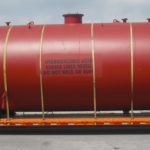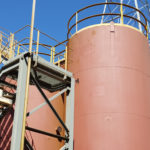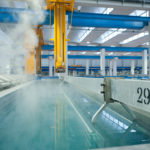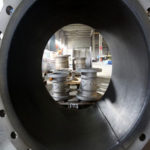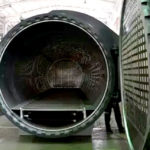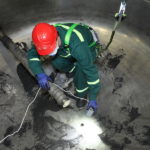Various industrial processes such as burning fossil fuels and refining gasoline produce sulfur dioxide as a byproduct. You can’t simply release sulfur dioxide into the atmosphere as these toxins are dangerous to humans, animals, plants, and the environment. As we’ve previously mentioned, when … [Read more...]
Acid Storage Tank Fabrication Requires Special Consideration
Acid is one of the most corrosive and dangerous materials chemical processing workers handle — and sulfuric acid is one of the most common agents within this group. In fact, global sulfuric acid production stands at approximately 180 million tons per year. Sulfuric acid is a clear liquid solution, … [Read more...]
4 Considerations for Water and Wastewater Tank Fabrication
Water and wastewater management are highly regulated in the United States. Many standards exist to minimize harmful consequences at the hands of soiled water, including those set forth in the Clean Water Act. Regardless of industry, many facility leaders are tasked with managing water and wastewater … [Read more...]
Tank Anodization Can Offer More than Corrosion Protection
Combating corrosion is an ongoing battle for many plant managers working alongside industrial tanks. One line of defense is to anodize your metal tanks and piping for added protection. Applying this electrochemical process helps seal many types of metals, primarily aluminum alloys, in a way that … [Read more...]
Corrosion Resistant Rubber Liners: What to Consider for Your Facility
The longer tanks and piping store, transport, and mix caustic and abrasive materials, the more at risk they become for failures at the hands of corrosion and wear and tear. The majority of U.S. industrial facilities are more than 20 years old. This leaves many in need of equipment maintenance and, … [Read more...]
Line for Longevity: Consider Fiberglass Reinforced Plastic (FRP) Linings in Your Tanks
Facility leaders understand the importance of storage tank integrity and the potential consequences of tank failures. They also know corrosion can play a major role in many of those failures. To fight back against corrosion effects, tank operators must use every available resource to ensure … [Read more...]
Rubber Vulcanization: The Makings of Viable Tank and Pipe Liners
Maintaining tank integrity is key to preventing spills and other significant failures. One aspect crucial to ensuring integrity is using rubber liners in your tanks. Rubber serves as a secondary containment liner to help safeguard tanks from the often highly corrosive and harsh materials stored … [Read more...]
Reduce Leak Risks in Aboveground Storage Tanks
Aboveground storage tank leaks, spills, and failures are costly events that can be disastrous for tank owners and plant employees as well as the surrounding environment and population. According to the National Association for Corrosion Engineers (NACE), leaking tanks can “lead to billions of … [Read more...]
Are You Meeting API 653 Inspection Standards?
Metal and stainless steel storage tanks often contain highly corrosive or caustic materials that degrade and break down their containers. Conducting regular aboveground tank inspections is incredibly important for detecting any potential storage tank failures that could be detrimental to facilities, … [Read more...]
Tank Cleaning: Hazards to Avoid and Safety Tips to Protect Your Tanks
Establishing regular plant maintenance activities is an important proactive measure savvy plant managers can take to help ensure safe operations and facility longevity. These maintenance schedules should include a plan for routine storage tank cleaning. Debris and corrosion causing contaminants … [Read more...]


